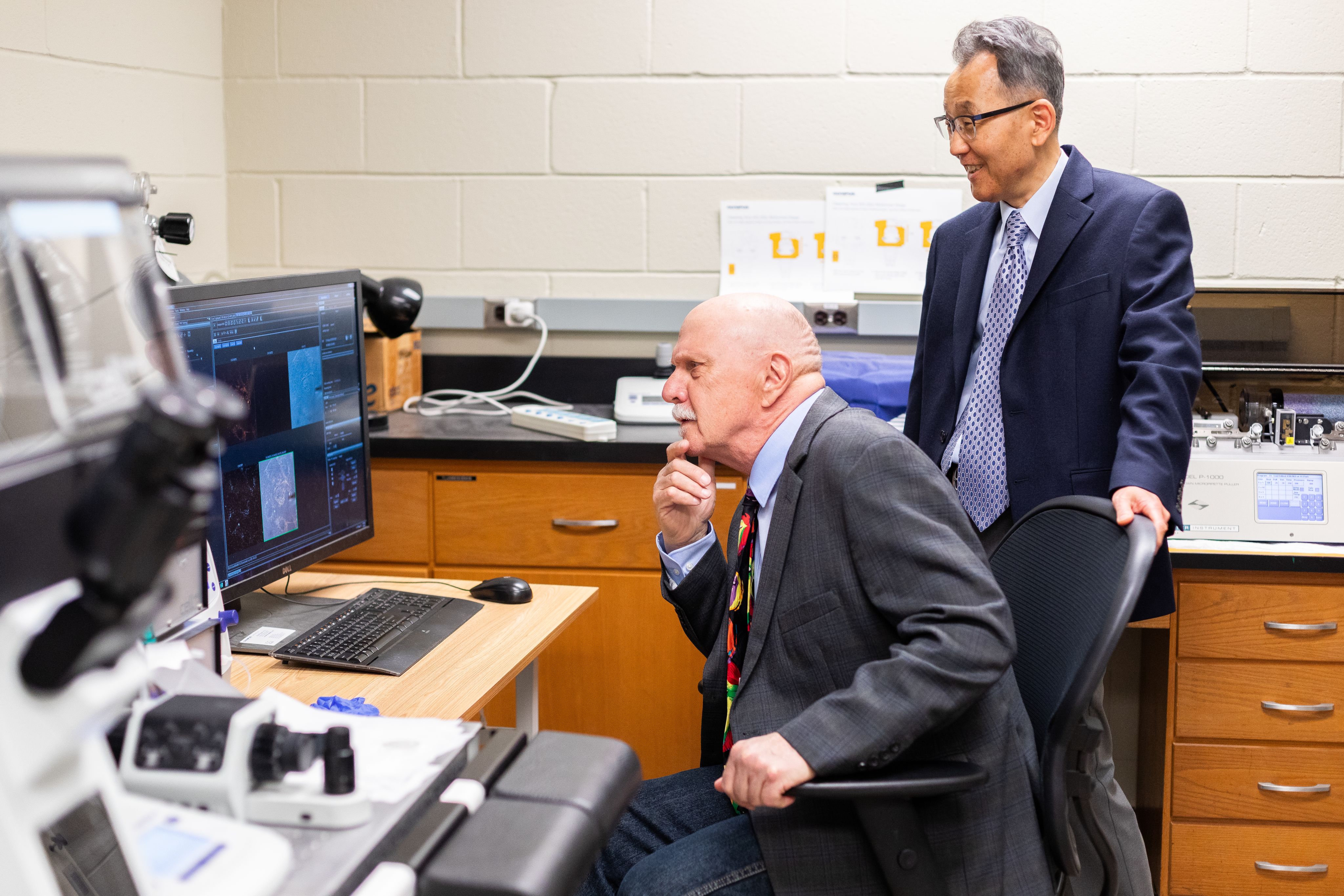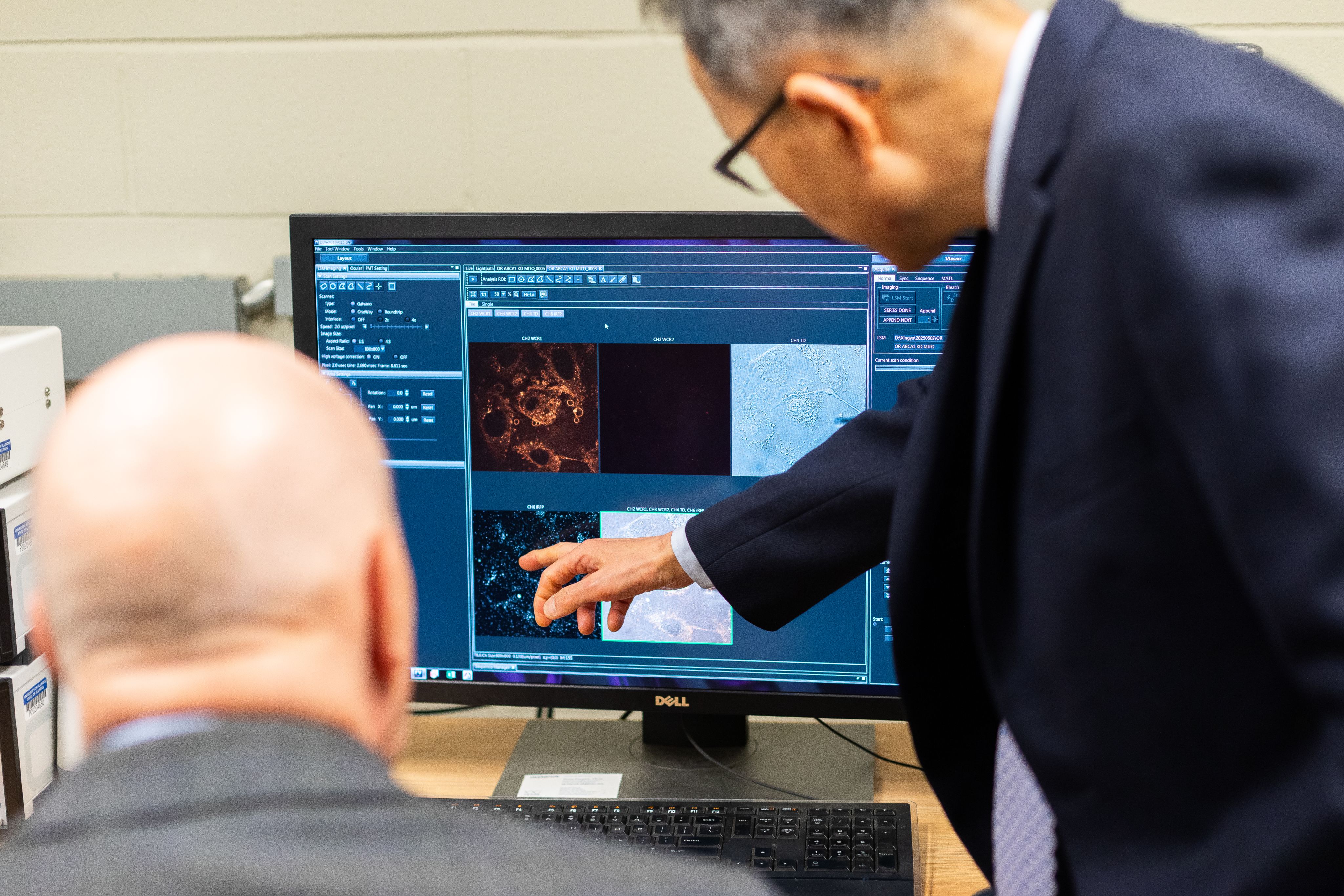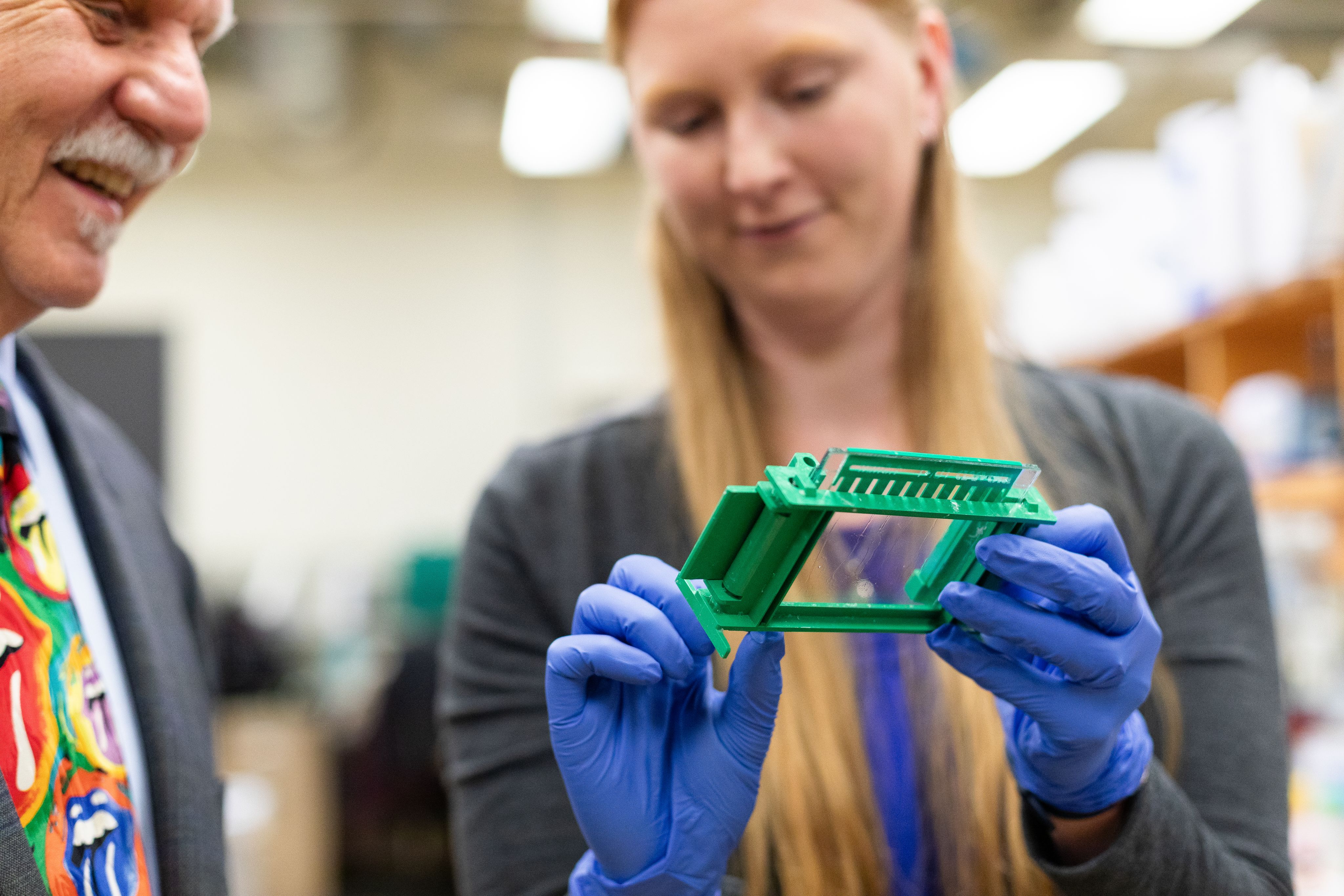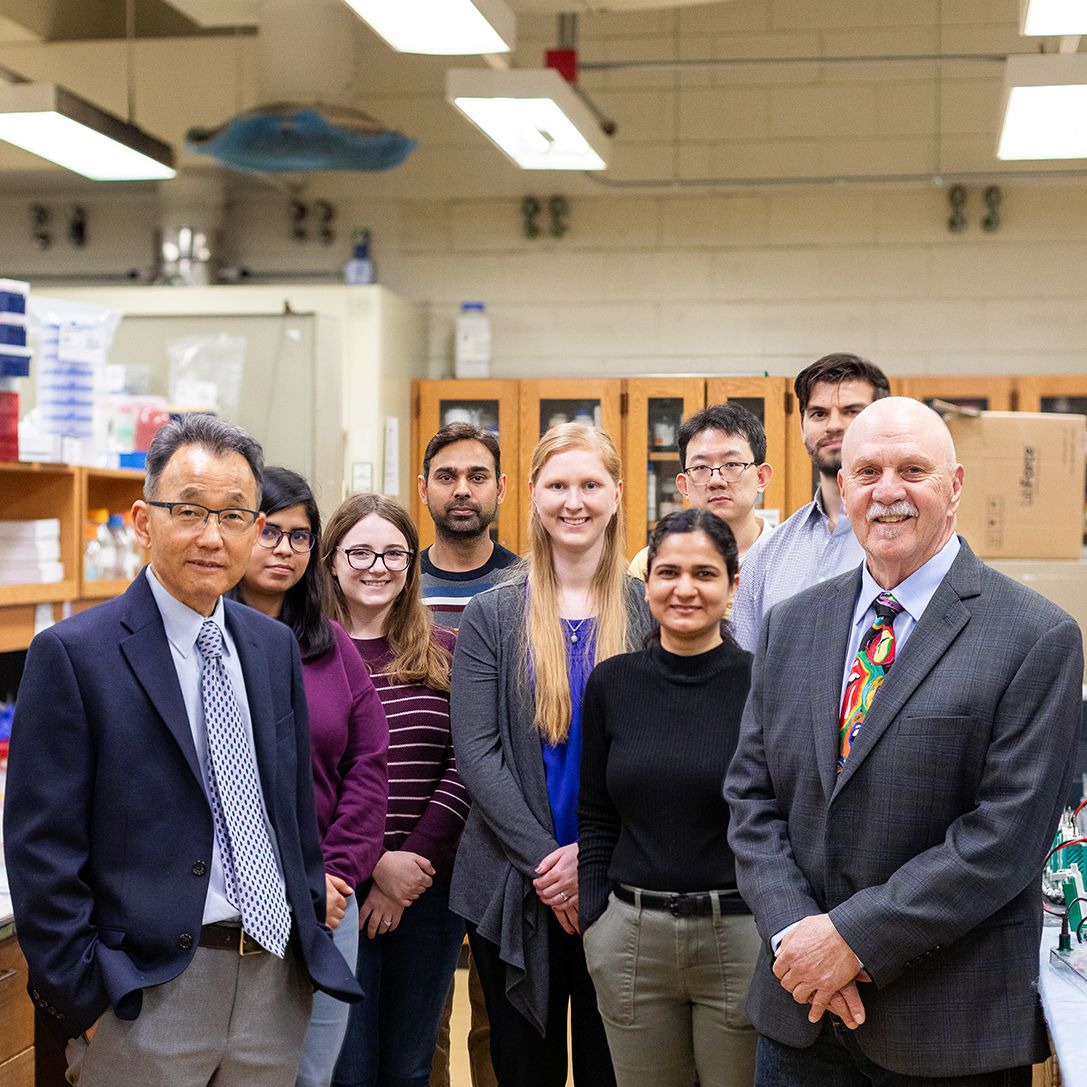Good Things Can Happen
UIC helped alumnus Herb Paaren expand what he thought was possible. His $2 million gift is helping do the same with drug discovery
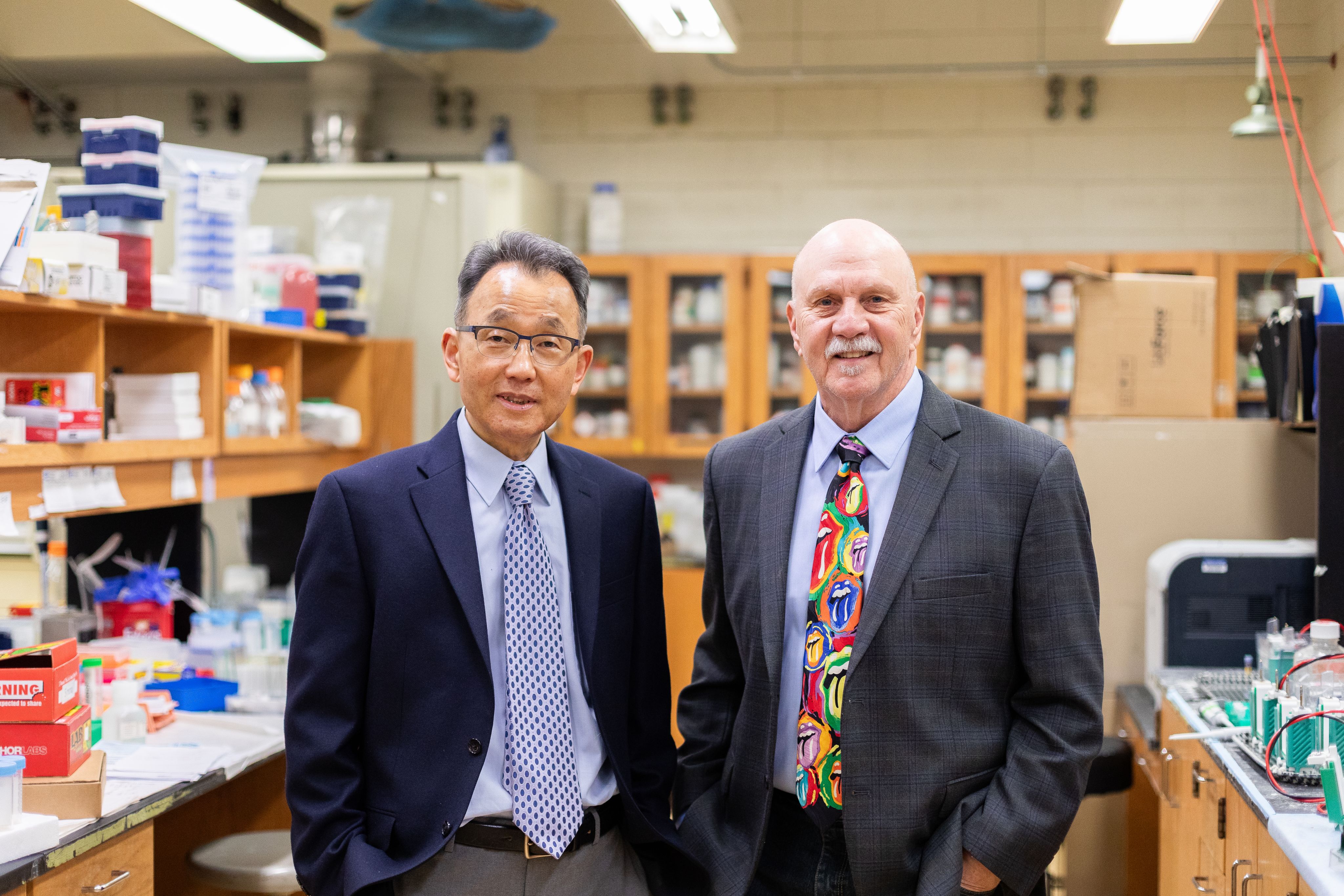
Good Things Can Happen
UIC helped alumnus Herb Paaren expand what he thought was possible. His $2 million gift is helping do the same with drug discovery
Photos by Katie Klema
UIC isn’t just one of the best academic centers for drug discovery in Illinois. It’s one of the best, period. The university consistently ranks among the top 25 academic institutions for licensing revenue, with 90% coming from medical treatment innovations. While earning revenue is not UIC’s primary goal, it illustrates an ability to identify and address patient needs. Key players in this success are our medical, pharmaceutical, chemistry and cancer programs, all of which are located in different buildings. So, what could happen if a dedicated space was built where these stakeholders could conduct drug discovery and cancer research together?
Hence the forthcoming Drug Discovery and Cancer Research Pavilion (DDCRP). At the new facility, world-class scientists from the University of Illinois Cancer Center, the Herbert M. and Carol H. Retzky College of Pharmacy, the Department of Chemistry from the College of Liberal Arts and Sciences, and the University of Illinois Collaborative Engagement in Novel Therapeutic Research and Enterprise (UICentre) will collaborate on more effective and equitable disease treatments, screenings and preventions – all under one roof. The energy and engagement – and the innovation – that will ensue are priceless.
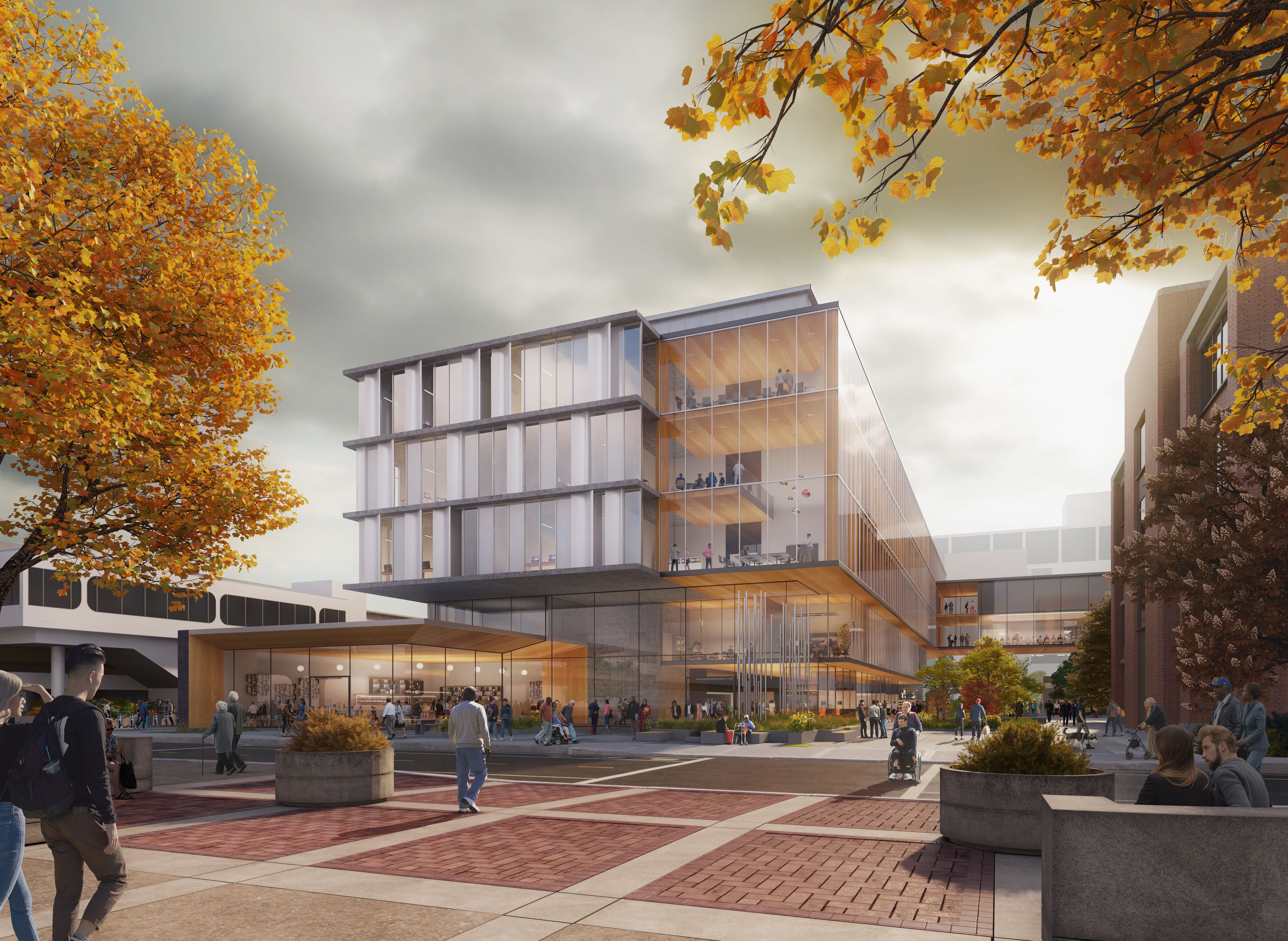
The idea sounded good to Herb Paaren BS ’71, MS ’73, PhD ’76, a synthetic organic chemist and pharmaceutical manufacturing company principal and co-founder who blessed the venture with a $2 million gift for its construction.
“It’s a perfect way to support UIC, given the way federal and state funding has been drying up,” Paaren said. “A good drug with patent protections and a royalty revenue stream can really help the university. Put all the smart people in one room, and good things can happen.”
Commenting on the gift, Wonhwa Cho, the head of UIC’s Chemistry Department, described Paaren as “one of the most generous and important supporters of our department.”
College of Liberal Arts and Sciences Dean Lisa A. Freeman agreed, lauding Paaren’s “extraordinary commitment.”
Paaren grew up in Chicago’s Hegewisch neighborhood, an industrial community anchored by Lake Calumet and situated near the Illinois-Indiana border. At the time, Hegewisch contained plentiful factory and steel-mill jobs for its residents – a solid path to the middle class. But a high school teacher who saw potential in Paaren made him his lab assistant, which helped Paaren get into a six-week biochemistry program for high school seniors at Connecticut’s Loomis Chaffee School.
“When I came back, I realized I needed to get serious about some kind of college arrangement,” Paaren said.
“UIC was very accommodating. They took me right in.”
He particularly cites the influence of the late Professor Robert Moriarty, who invited him to conduct research in his lab.
After UIC, Paaren completed a National Institutes of Health Fellowship at the University of Wisconsin-Madison. His research into innovative synthetic methodology and drug metabolism led to Tetrionics, the pharmaceutical manufacturing company founded in 1990 and sold to Sigma-Aldrich in 2004. The sale introduced “a scenario where I had, let's say, available capital to invest,” Paaren said. He and his wife, Denise Marino, launched an endowment in LAS to fund graduate-student scholarships and summer internships for undergraduates interested in chemical sciences, and their Single Step Foundation has supported students’ scientific pursuits and provided funds to modernize UIC’s library. The couple has also donated significantly to UIC’s chemistry department to enhance its chemistry curriculum and laboratories.
The DDCRP’s goal of facilitating better health outcomes so that all people can reach their personal, educational and economic aspirations aligned perfectly with Paaren’s ideals.
“Every time I come back to UIC, I see the face of Chicago,” Paaren said.
The DDCRP’s goal of facilitating better health outcomes so that all people can reach their personal, educational and economic aspirations aligned perfectly with Paaren’s ideals.
“I think Chancellor Miranda has done a great job of pushing [the DDCRP] forward. She's totally focused on getting it over the hill and is very supportive of it.”
Discussing Paaren and the university’s mutual commitment to the project, Chancellor Marie Lynn Miranda said, “UIC is deliberate and laser-focused on eliminating disparities, which makes the Drug Discovery and Cancer Research Pavilion a top priority.
“Herb Paaren is a proven expert in this space, and I’m tremendously grateful for his generous gift that endorses our vision. With a focus on druggable targets in diseases characterized by health disparities, the DDCRP will drive drug discovery research and innovation that creates positive health outcomes for all people,” she said.
Ultimately, Paaren hopes his donation will help connect the East and West campuses in a more consequential way, and that the DDCRP’s discoveries will bolster UIC’s and Chicago’s pride in the university. “Something along the lines of a very successful, collaborative, integrated drug discovery program” will help drive home the point of drug discovery as an institutional process, rather than a eureka moment, he said.
This sentiment was echoed by Cho, who noted that UIC is currently “limited by the lack of the state-of-art infrastructure and facilities for translational research.”
“This new gift will make a huge difference in our effort to build and grow a world-class research program in drug discovery,” he added.
Paaren also hopes his example encourages other alumni with “available capital” to give toward the project — and to UIC in general.
“It's not like old money is going to be thrown at UIC, because there's not a whole lot of old money around at UIC,” he said, noting the relative youth of the university. (UIC’s original “Circle Campus” opened in 1965.) “The alumni who could be philanthropically active right now likely came from kind of the same background I did. You have a certain upbringing that never leaves you.”
Freeman said she believed that Paaren’s leadership “will undoubtedly inspire others to join us in building this transformational research facility.”
Ideally, the combination of hard work and gratitude that Paaren highlights will maintain UIC’s prominence for future generations.
“I would hope that people — or at least my generation — at UIC who did become successful would look at it and say, ‘I remember when UIC did me a favor, so I'm gonna do it a favor now,’” Paaren said.
UIC isn’t just one of the best academic centers for drug discovery in Illinois. It’s one of the best, period. The university consistently ranks among the top 25 academic institutions for licensing revenue, with 90% coming from medical treatment innovations. While earning revenue is not UIC’s primary goal, it illustrates an ability to identify and address patient needs. Key players in this success are our medical, pharmaceutical, chemistry and cancer programs, all of which are located in different buildings. So, what could happen if a dedicated space was built where these stakeholders could conduct drug discovery and cancer research together?
The proposed Drug Discovery and Cancer Research Pavilion. Renderings do not represent final building plans and are subject to change.
The proposed Drug Discovery and Cancer Research Pavilion. Renderings do not represent final building plans and are subject to change.
Hence the forthcoming Drug Discovery and Cancer Research Pavilion (DDCRP). At the new facility, world-class scientists from the University of Illinois Cancer Center, the Herbert M. and Carol H. Retzky College of Pharmacy, the Department of Chemistry from the College of Liberal Arts and Sciences, and the University of Illinois Collaborative Engagement in Novel Therapeutic Research and Enterprise (UICentre) will collaborate on more effective and equitable disease treatments, screenings and preventions – all under one roof. The energy and engagement – and the innovation – that will ensue are priceless.
The idea sounded good to Herb Paaren BS ’71, MS ’73, PhD ’76, a synthetic organic chemist and pharmaceutical manufacturing company principal and co-founder who blessed the venture with a $2 million gift for its construction.
“It’s a perfect way to support UIC, given the way federal and state funding has been drying up,” Paaren said. “A good drug with patent protections and a royalty revenue stream can really help the university. Put all the smart people in one room, and good things can happen.”
Commenting on the gift, Wonhwa Cho, the head of UIC’s Chemistry Department, described Paaren as “one of the most generous and important supporters of our department.”
College of Liberal Arts and Sciences Dean Lisa A. Freeman agreed, lauding Paaren’s “extraordinary commitment.”
Paaren grew up in Chicago’s Hegewisch neighborhood, an industrial community anchored by Lake Calumet and situated near the Illinois-Indiana border. At the time, Hegewisch contained plentiful factory and steel-mill jobs for its residents – a solid path to the middle class. But a high school teacher who saw potential in Paaren made him his lab assistant, which helped Paaren get into a six-week biochemistry program for high school seniors at Connecticut’s Loomis Chaffee School.
“When I came back, I realized I needed to get serious about some kind of college arrangement,” Paaren said.
“UIC was very accommodating. They took me right in.”
He particularly cites the influence of the late Professor Robert Moriarty, who invited him to conduct research in his lab.
After UIC, Paaren completed a National Institutes of Health Fellowship at the University of Wisconsin-Madison. His research into innovative synthetic methodology and drug metabolism led to Tetrionics, the pharmaceutical manufacturing company founded in 1990 and sold to Sigma-Aldrich in 2004. The sale introduced “a scenario where I had, let's say, available capital to invest,” Paaren said. He and his wife, Denise Marino, launched an endowment in LAS to fund graduate-student scholarships and summer internships for undergraduates interested in chemical sciences, and their Single Step Foundation has supported students’ scientific pursuits and provided funds to modernize UIC’s library. The couple has also donated significantly to UIC’s chemistry department to enhance its chemistry curriculum and laboratories.
The DDCRP’s goal of facilitating better health outcomes so that all people can reach their personal, educational and economic aspirations aligned perfectly with Paaren’s ideals.
“Every time I come back to UIC, I see the face of Chicago,” Paaren said.
The DDCRP’s goal of facilitating better health outcomes so that all people can reach their personal, educational and economic aspirations aligned perfectly with Paaren’s ideals.
“I think Chancellor Miranda has done a great job of pushing [the DDCRP] forward. She's totally focused on getting it over the hill and is very supportive of it.”
Discussing Paaren and the university’s mutual commitment to the project, Chancellor Marie Lynn Miranda said, “UIC is deliberate and laser-focused on eliminating disparities, which makes the Drug Discovery and Cancer Research Pavilion a top priority.
“Herb Paaren is a proven expert in this space, and I’m tremendously grateful for his generous gift that endorses our vision. With a focus on druggable targets in diseases characterized by health disparities, the DDCRP will drive drug discovery research and innovation that creates positive health outcomes for all people,” she said.
Ultimately, Paaren hopes his donation will help connect the East and West campuses in a more consequential way, and that the DDCRP’s discoveries will bolster UIC’s and Chicago’s pride in the university. “Something along the lines of a very successful, collaborative, integrated drug discovery program” will help drive home the point of drug discovery as an institutional process, rather than a eureka moment, he said.
This sentiment was echoed by Cho, who noted that UIC is currently “limited by the lack of the state-of-art infrastructure and facilities for translational research.”
“This new gift will make a huge difference in our effort to build and grow a world-class research program in drug discovery,” he added.
Paaren also hopes his example encourages other alumni with “available capital” to give toward the project — and to UIC in general.
“It's not like old money is going to be thrown at UIC, because there's not a whole lot of old money around at UIC,” he said, noting the relative youth of the university. (UIC’s original “Circle Campus” opened in 1965.) “The alumni who could be philanthropically active right now likely came from kind of the same background I did. You have a certain upbringing that never leaves you.”
Freeman said she believed that Paaren’s leadership “will undoubtedly inspire others to join us in building this transformational research facility.”
Ideally, the combination of hard work and gratitude that Paaren highlights will maintain UIC’s prominence for future generations.
“I would hope that people — or at least my generation — at UIC who did become successful would look at it and say, ‘I remember when UIC did me a favor, so I'm gonna do it a favor now,’” Paaren said.
